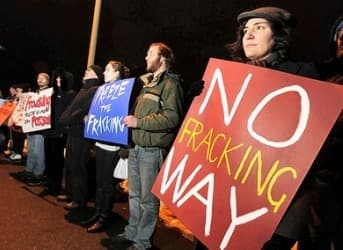Mexican President Jose de la Cruz Porfirio Diaz Mori once reputedly said nearly a century ago, “¡Pobre México¡ Tan lejos de Dios y tan cerca de los Estados Unidos¡” (“Poor Mexico, so far from God and so close to the United States!”)
In 2009 eminent Mexican author Carlos Fuentes updated Diaz’s aphorism to proclaim, “'Poor Mexico and poor United States, so far from God and so near to each other.”
America’s Great White North neighbor, Canada, might paraphrase Fuentes to state, “Why do the uppity Yanks repeatedly bash their major energy supplier?”
According to the U.S. Energy Administration, the United States total crude oil imports now average 9,033 thousand barrels per day (tbpd), with Canada being the top exporting country, sending 2,666 tbpd southwards.
Not that Ottawa gets any thanks for it, having been blindsided last month in its bid to begin construction of the Keystone XL pipeline.
But borders are not impermeable, and now, U.S. state concerns about the possible consequences of hydraulic fracturing for natural gas (“fracking” in the popular press) are percolating across the U.S.-Canadian border, causing further headaches for the energy-export fixated government of Conservative Prime Minister Stephen Harper.
On 7 February, a poll conducted by Environics Research for the Council of Canadians, an anti-fracking group, indicated 62 percent of respondents said they supported an outright ban on fracking "until all the federal environmental reviews are complete."
Can’t blame the Yanks for this one.
What has got the Canadians so uppity?
Well, for a start, 90 percent of fracking worldwide takes place in North America.
The possible environmental consequences of the fluids squirted down the boreholes to release the trapped natural gas concern the opposition, with some critics alleging that they damage the environment. Canadian regulations on water and drilling permits vary from province to province and oil and gas wells are currently exempt from the National Pollutant Release Inventory.
Council of Canadians official Emma Lui said, "The poll results send a strong message that Canadians really want the federal government to put in place a moratorium until the reviews are complete, and so we're hoping that the federal government will take up the call. One of the biggest concerns are the impacts on water sources, in terms of potential contamination and the amount of water that's used for fracking, but there's also greenhouse gases and then impacts on public health in that we don't know for sure what chemicals companies are using."
In contrast the Canadian Association of Petroleum Producers maintains that the practice can be done safely and reliably and in January 2012 released a new set of fracking guidelines.
Now, fracking is a political issue in Canada. Last week Member of Parliament New Democratic Party leadership candidate Thomas Mulcair spoke at the University of New Brunswick and said, “I would put it to you that the issue of shale gas extraction and hydro-fracking are almost metaphors for our society at the stage that we’re at now… The only way to combat an issue like this is with solid information.
Emotionalism is not going to help. We’ve got to make sure that people understand that there’s a real danger in this one, explain what it is, and then they will push really hard to require that rules be put in place and enforced.”
Mulciar has impressive credentials, having served as Quebec’s Minister of Sustainable Development, Environment and Parks from 2003 until 2006.
In September 2011 the federal conservative government launched two separate reviews on the science and use of hydraulic fracturing by the energy industry in Canada and its impact on the environment and the studies are expected to be completed by 2014. There is currently no federal legislation on fracking, although as Environment Minister Peter Kent has previously noted, exploitation of Canada’s natural resources is not regulated by the federal government.
Anyway, such indigenous whiny tree-hugging may yet prove moot. On 7 February Canadian Prime Minister Stephen Harper arrived in Beijing for a a five-day official visit to China, his second China visit since he came to office in 2006, with a large business delegation with representatives from the energy, transport, and education sectors.
So, besides sending their environmental concerns north of the border, if them pesky Yanks won’t buy our energy exports, there’s always…
What’s at stake?
ADVERTISEMENT
Alberta’s Cold Lake, Athabasca and Peace River bitumen and quartz sands have been in commercial production since the original Great Canadian Oil Sands (now Suncor) mine began operation in 1967, with investments now topping $97 billion. Studies have determined that Canada has 170 billion barrels of oil reserves, second only to Saudi Arabia.
Ottawa is fully onboard with fracking, even as some officials have questioned the wisdom of supporting the operations. Alberta and British Columbia have competed for new investment by offering financial incentives and loosening rules, resulting in some of the most intensive drilling anywhere. Canadian Centre for Policy Alternatives analyst Ben Parfitt commented, "We are seeing some of the largest fracking operations anywhere on earth."
Ongoing unspoiled landscapes or energy dollars from their energy ravenous southern neighbors?
No guesses as to how Ottawa will decide.
By. John C.K. Daly of Oilprice.com


















